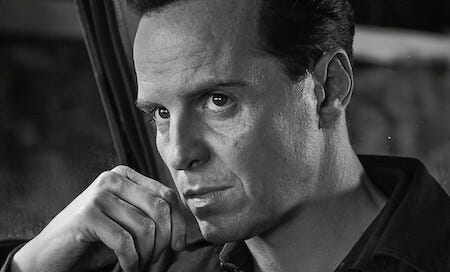I wondered how Netflix was going to stretch a relatively short novel into a mini-series of eight episodes, and the first two+ episodes of Ripley seem to answer that question: slow things down. Way down.
A New York Times reviewer calls the pace “somnolent” which couldn’t be more accurate because as Lincoln said of General McClellan, this show has “ a case of the slows.”
When the Patricia Highsmith novel opens, Tom Ripley is approached in a bar by Dickie Greenleaf’s father for help to bring his son back from Italy where he’s wasting his life “painting.” In the mini-series, it’s a PI who makes the connection with Tom and adding the PI as a go-between is pointless filler. (Given that this Ripley is middle-aged as opposed to not-long-out-of- college, it seems ridiculous that his father thinks he can be convinced to give up living in Europe.)
More annoying filler has Ripley riding back and forth on the subway in New York. Worse than that, we soon afterward see him schlepping up and down what seems like endless stone stairs in a tiny Italian town (and Tom got there on a pointlessly long bus ride). Yes, those stairs can be read as a metaphor for the difference in their social positions, since Tom at the bottom is a grifter and Dickie in his villa at the top has a trust fund. But I don’t see why we need these “Nudge, nudge, know what I mean?” moments—even if there are references in the novel to stairs.
While the black-and-white cinematography is luscious and sometimes spectacular, it completely eclipses the script and the boring cast. So far, the series lacks true glamour, as when Dickie and Tom go to see one of the three Caravaggios in Naples and you have no real sense of its awesome power or the setting in the beautiful Pio Monte della Misericordia church.
It’s not just Italy that seems drab (Santo cielo!): Johnny Flynn as Dickie and Dakota Fanning as Marge have very little charisma. While you can see how Tom wants Dickie’s life, it’s hard to picture why he would want to be Dickie. And Marge dislikes Tom from the first moment they meet—why on earth would she let him edit her book?
As for Andrew Scott, he too is dull and doesn’t manifest the ingratiating, sneaky charm that’s a key characteristic of sociopaths, something Matt Damon had in spades in the 1999 movie. Scott just seems as grim as he did in All of Us Strangers—and just as monotone. Most disappointing is that in the movie, we can read Damon’s emotions and thoughts even when he’s silent, while Scott is opaque. I don’t fault the actor, I blame the director, since there’s a funereal cast to the whole enterprise.
The novel was brilliant in many ways, not least because it made you paradoxically care about Ripley and worry about him being caught: a wonderful reversal that Minghella understood was key and played with in the film. By stripping Tom Ripley of his sociopathic charm and making him as impassive and affectless as the Netflix series does, all you end up with is an automaton who isn’t worth your time or concern.
There’s another problem: in the novel and the film, Tom and Dickie are both twenty-five, but in the series, they’re played by actors almost twice that age and the dynamic feels off. The casting throws the story completely out of whack. It’s one thing for a father to ask his son who recently graduated from college to give up Europe for the family business back home, but asking a middle-aged man?
Another casting problem: the actor playing Freddie is epicene and totally unlike the big, bluff, flamboyant character in the book who was perfectly realized by Phillip Seymour Hoffman in the movie.
I’m sticking with Ripley to see how it plays out, but I thought it was a bad sign that the series got off to a ridiculous start. We see Tom dragging a dead body down a staircase, the head making a loud clunk with each step, waking up neighbors. Matt Damon in the movie does a much better job of navigating the aftermath of murder.
Yes, I know most of the reviews on Rotten Tomatoes are glowing (though viewers aren’t raving as much). Non m'importa. Right now, I agree with the USA Today critic who wrote " ‘Nice to look at but nothing going on inside’ is an insulting thing to say about a person, and also an accurate description of Netflix's Ripley."
Lev Raphael is the former crime fiction reviewer for The Detroit Free Press and the author of ten crime novels, one of which was nominated for a Midwest Book Award. He’s been reading mysteries and thrillers for decades. He’s devoted to British crime and spy series like Line of Duty and MI5 as well as slow-burn mystery series like Broadchurch and Unforgotten.





Ripley is essentially a striver, and striver characters are often fascinating because they're charming and driven and duplicitous. In this version, Ripley is a soulless nebbish. The cinematography and editing are stunning, but there's nothing and no one at the center. The filmmakers have essentially misunderstood the character Highsmith created. Creative re-interpretations are fine, but his one fails to engage on the essential level of character.
Finished it last night. Beautifully shot, as you note, but if anyone gets into a drinking game in which you toss one back every time a staircase appears, they won't make it through episode two. The actors are all tools for the look of it, and pale (literally, in b&w) compared to the movie leads. Still, worth a go through the whole thing I thought, but maybe because it's sometimes difficult for my wife and I to find the next series/show together. It was this or "Ricky Stanicky."